 From the Director
From the Director
Welcome to the May/June 2022 edition of the ADNeT newsletter. In this issue:
- Highlights from the Australian Dementia Research Forum (ADRF) 2022
- Congratulations to the ADRF2022 award winning presentations
- ADNeT to conduct world-first trial to evaluate impact of novel blood tests
- ADNeT researchers presenting at the World Dementia Council Summit
- Updates on grant opportunities, patient referral, and screening volunteers.
- Upcoming webinars
I hope you enjoy this month’s newsletter.
Chris
News
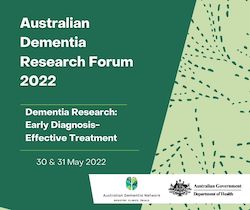
Highlights from the Australian Dementia Research Forum (ADRF) 2022
The ADRF2022, held virtually from May 30th to June 1st was a great success. With over 500 delegates registered, a program full of keynote international and national experts in dementia research, and a rich variety of presentation formats including oral presentations, panel sessions, poster blitz, and symposiums, the forum saw strong engagement, lively debates, and valuable conversations on the current trends and issues in dementia research.
Highlights of ADRF2022 include:
– our eight keynote speakers;
– the Great Debate on whether Anti-Aβ Amyloid Therapies Should Be Made Available to Treat Alzheimer’s disease in Australia, which was won by Associate Professor Scott Ayton, who argued for the negative opposite Professor Colin Masters;
– panel discussion with the Australian Government Department of Health on the Translational Research Focus for Aged Care; and
– VIP drinks held in-person on the evening of May 30th in Melbourne, Sydney, Brisbane, Adelaide and Perth. The concurrent events provided ample networking opportunities for all attendees and ignited lively discussions about the future of dementia research in Australia.
ADNeT values the successful partnership with the Australian Government Department of Health and in particular their contribution to the panel session on the Translational Research Focus for Aged Care. We would like to thank:
- Mr Michael Lye (Deputy Secretary, Ageing and Aged Care, Department of Health) for his video contribution calling for researchers to participate in the Department’s initiatives on aged care reforms to ensure early diagnosis and better post-diagnostic support for people living with dementia; and
- Mr Robert Day (Assistant Secretary, Dementia, Diversity & Design, Department of Health) for his participation in the live discussion, offering his discerning and insightful views on co-design and translational research in aged care.
The audience of approximately 245 delegates engaged in robust discussions via the virtual platform, contributing responses to issues raised by the panellists. Feedback received indicates overwhelming interest in similar panel discussions with the government in future forums.
We would like to thank all ADRF2022 delegates who enthusiastically engaged with our presenters and other participants. If you missed any of this year’s forum sessions, the virtual platform will remain open until the end of July, where you can replay all recorded sessions.
We look forward to seeing you all next year at ADRF2023.
ADRF2022 Award Winners

This year’s forum had an incredible program, ranging from our keynote speakers to oral presentations, poster blitzes, symposiums, panel discussions and the Great Debate.
Best Oral Presentations by Themes
The work presented was engaging, novel and of exceptional quality. We extend our congratulations to the following winners:
Theme 1: Basic Science and Pathogenesis
Winner: Dr Julien Bensalem
Theme 2: Biomarkers
Winner: Dr Vincent Dore
Theme 3: Clinical Manifestations
Winner: Associate Professor Genevieve Steiner-Lim
Theme 4: Dementia Care
Winner: Dr Mouna Sawan
Theme 5: Public Health and Prevention
Winner: Dr Simone Reppermund
Best Poster Presentation for Early to Mid-Career Researchers
The inaugural Mr Baillieu Myer Award AC, kindly sponsored by Dementia Australia, was presented at the forum. This is a special award in recognition of the late Mr Baillieu Myer AC. Mr Myer’s generosity and support through the Yulgilbar Foundation contributed to the success of the Australian Dementia Network.
There are 2 best poster presentation prizes for Early to Mid-Career Researchers:
- 1st prize – the Mr Baillieu Myer Award AC – went to Dr Amanda Lumsden for her presentation Metabolic Profiles Associate with Brain Volumes and Brain Iron Deposition: a Large-Scale Analysis.
- 2nd prize was awarded to Ms Lisa Bransby on her presentation Contribution of Modifiable Dementia Risk Factors to Cognitive Performance and Subjective Cognition in Middle-Aged Adults.
The People’s Choice Award for Best Overall Presentation
We congratulate Dr Marita Long, who is this year’s recipient of the award, voted by the forum attendees for the best overall presentation Positioning GPs to Better Care for People Living with Dementia.
ADNeT to Conduct a World-First Pilot Trial to Evaluate the Impact of Novel Blood-Tests
 Recently, there have been global breakthroughs in new blood-tests that allow us to detect dementia pathology in the blood. Exciting international data suggest that these blood markers may be able to revolutionise the diagnosis of dementia and will be more widely available and less expensive than current methods. While there is much work to be done, it is critical for researchers to determine how doctors may benefit from the availability of such tests in their practice, and whether it influences a doctor’s diagnostic confidence and management.
Recently, there have been global breakthroughs in new blood-tests that allow us to detect dementia pathology in the blood. Exciting international data suggest that these blood markers may be able to revolutionise the diagnosis of dementia and will be more widely available and less expensive than current methods. While there is much work to be done, it is critical for researchers to determine how doctors may benefit from the availability of such tests in their practice, and whether it influences a doctor’s diagnostic confidence and management.
The Australian Dementia Network will conduct a world-first pilot trial aiming to evaluate the impact of these novel blood-tests on a doctor’s clinical diagnosis, confidence and management for persons attending a memory clinic with diagnostic uncertainty or mild cognitive impairment.
Professors Christopher Rowe, Sharon Naismith, and James Vickers will lead this study across three centres, Austin Health CDAMS in Victoria, University of Sydney’s Healthy Brain Ageing Clinic, and the University of Tasmania’s ISLAND Clinic, working in collaboration with other national experts in the field, including Professor Ralph Martins, Professor Anna King and Dr Jane Alty. The study will be coordinated by Dr Johannes Michaelian from the University of Sydney.
More information on this trial are available on the Australian New Zealand Clinical Trial Registry (ACTRN12622000515796), which can be accessed here.
World Dementia Council Summit 2022
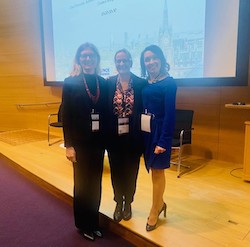
The World Dementia Council Summit 2022 took place on March 28th 2022 at the Francis Crick Institute in London, UK. The theme for this year was Looking to the Future: the Dementia Landscape. It brought together global dementia leaders, policy-makers, and advocates to reflect on what has been achieved in the fields of research and care and identify public policy challenges that need to be overcome to accelerate progress.
ADNeT’s Chief Investigator Professor Kaarin Anstey gave a plenary presentation with Professor Miia Kivipelto and Ms Sara Locke from AARP. In this opening session of the summit that focussed on prevention and brain health, Professor Anstey provided a view of the landscape and outlined the need for population level approaches and evidence on younger cohorts, as well as the importance of working with other non-communicable diseases. She also emphasised that dementia has unique risk and protective factors, and the thresholds for risk and protective factors may also be different for dementia.
ADNeT Screening and Trials co-lead Professor Colin Masters spoke on the topic From Basic Science to New Treatments about treatments for Alzheimer’s Disease and looked at drug targets over and above Abeta amyloid, including Apolipoprotein E and a growth factor.
Updates
 Grants for early to mid-career researchers
Grants for early to mid-career researchers
Are you an early to mid-career (EMCR) dementia researcher looking for grant opportunities, but not sure where to start? The ADNeT EMCR Accelerator group has put together a list of both dementia-specific and general EMCR grant opportunities. The list will be updated regularly with dates and status of application rounds.
If you know of any other relevant grant opportunities, please do not hesitate to contact either Ayeisha Milligan Armstrong (ayeisha.milligan@postgrad.curtin.edu.au) or Dr Julien Bensalem (julien.bensalem@sahmri.com).
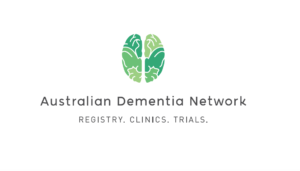 Patient referral for screening and trials
Patient referral for screening and trials
Are you a clinician wanting to refer your patient for screening and trials? Our referral process has been updated and is now available as a direct online referral through the ADNeT website https://www.australiandementianetwork.org.au/clinician/refer-a-patient/
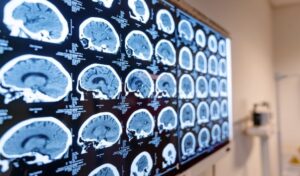 Volunteers needed for screening and trials
Volunteers needed for screening and trials
Persons aged over 55 are needed for dementia prevention trials in each Australian state. If you are interested in being screened (which involves blood tests and brain scans) for future risk of Alzheimer’s disease with a view to participation in a trial, please register on the ADNeT research volunteer site www.australiandementianetwork.org.au/i-am-a-member-of-the-public-or-consumer/volunteer-for-trials/
Upcoming Webinars
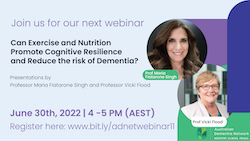 Can Exercise and Nutrition Promote Cognitive Resilience and Reduce the Risk of Dementia?
Can Exercise and Nutrition Promote Cognitive Resilience and Reduce the Risk of Dementia?
Part 1: Promoting Cognitive Resilience with Ageing
There is a large number of factors that contribute to the risk profile relevant to cognitive impairment with age, including interacting genetic, lifestyle, and ecological contributants across the lifespan. After birth, insufficient physical activity is among the important risk factors for dementia identified by the Lancet Commission, and there is empirical evidence that it also has a role in both prevention and treatment of many of the other risk factors: hypertension, obesity, depression, and diabetes, among many others. In the first part of the webinar, Prof Maria Fiatarone Singh will discuss the risk factors for the cognitive decline with age with the specific focus on physical activity and exercise. She will then talk about the specific exercise prescriptions that can help reduce the risk of dementia.
Part 2: Nutrition to Support Cognitive Function: Anti-Inflammatory Diets and Putting it into Practice
Observation research from longitudinal cohort studies have described reduced risk of cognitive decline among people who consume diets with higher adherence to Mediterranean diet or other similar diet patterns. There are fewer randomised control trials of diet and cognitive function, though there is a growing body of evidence of the potential for healthy diet patterns to slow cognitive decline. Potential mechanisms include improved metabolic health, reduced chronic inflammation, a healthy gut micro-biome, along with intake of key micronutrients. In this second part of the webinar, Prof Vicki Flood will briefly describe the evidence and discuss the practical elements of anti-inflammatory and Mediterranean diets.
Time: June 30th 2022 04:00 PM in Canberra, Melbourne, and Sydney
Past Webinars – Catch-up Viewing
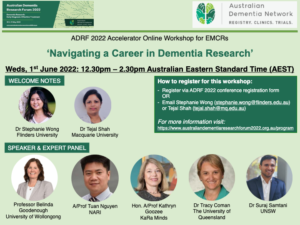 Navigating a Career in Dementia Research
Navigating a Career in Dementia Research
Watch the Early-Mid Career Researcher’s Accelerator group workshop from the ADRF2022 that explores the challenges and issues in Navigating a Career in Dementia Research.
Prof Belinda Goodenough presents her talk Experience and advice on becoming a leader in dementia research, followed by a Q&A session and a panel discussion with Prof Belinda Goodenough, A/Prof Tracy Comans, A/Prof Kathryn Goozee, A/Prof Tuan Nguyen, and Dr Suraj Samtani as they discuss their personal experiences and insights.
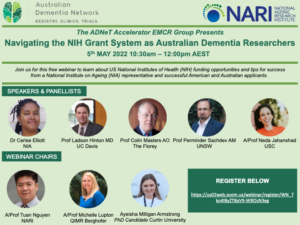
Navigating the NIH Grant Systems as Australian Dementia Researchers
Watch our latest webinar Navigating the NIH Grant Systems to learn about US National Institutes of Health (NIH) funding opportunities and tips for success from a National Institute on Aging (NIA) representative and successful American & Australian applicants.
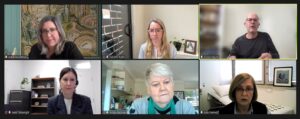
Young Onset Dementia Special Interest Group (YOD-SIG) ADRF2022 Workshop
Listen to the fascinating research findings and theories of special guest lecturers Professor Gil Rabinovici, Professor Muireann Irish and Professor Sebastian Crutch, who are world leaders in young onset dementia imaging, neuropsychology, and care research. This is followed by a robust panel discussion about the future of young onset dementia research in Australia from guests who are working in dementia research and care, or have lived experience.